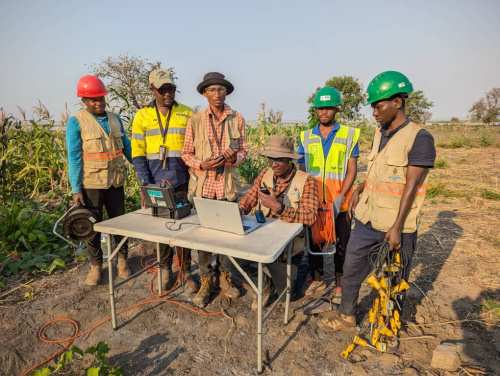School of Mines and Geosciences gears up for Helium exploration in Tanzania
By Jackson Isdory, CMU
In a groundbreaking step towards academic-industry partnership, the University of Dar es Salaam's School of Mines and Geosciences (SoMG) and Noble Helium, an international helium exploration company, have agreed to work together for transforming helium discovery and exploration in Tanzania.
The agreement, entered recently in Dar es Salaam, is focused on the Rukwa Shallow Geophysics (RSG) Project – that promises to bring cutting-edge techniques to the exploration industry as well as provide invaluable learning opportunities for students and staff at the university.
“This collaboration aims to detect helium gas anomalies in Tanzania’s Rukwa Basin through innovative and cost-effective seismic refraction methods”, said SoMG Dean, Dr. Elisante Mshiu.
He highlighted that as the school is leading the way in helium exploration, making it one of the few, if not the only, institutions in Africa with expertise in this niche field, this agreement paves a way for efficient and stronger efforts towards helium exploration in Tanzania and beyond.
“Our comprehensive skill set ranges from Helium Gas Geology and Gas Geochemistry to Geophysics, Sedimentology, and Geological Remote Sensing. With state-of-the-art equipment and comprehensive expertise we are an indispensable partner for Noble Helium; and we are able to produce reliable, international-standard data,” said Dr. Mshiu.
He added that SoMG’s team brings over 50 years of combined experience in geoscience research, including five years specifically focused on helium exploration. This collaboration, he explained, positions the school as a key player in the global helium industry, a development that aligns with the university's strategic vision of contributing to national and international scientific advancements.
Justyn Wood, Co-founder and Executive Director of Exploration at Noble Helium, said that “the RSG project is designed to push the boundaries of how helium is explored. Working with the University of Dar es Salaam adds a strong academic foundation to this groundbreaking research.”
Helium’s new resource for national economy
While helium is commonly associated with party balloons, it is a critical element used in a range of high-tech industries, from medical (MRI machines) to space exploration. Tanzania’s helium reserves have the potential to position the country as a global supplier of this valuable resource, a fact that makes the RSG project more important for national social economic development.
Dr. Ernest Mulaya, the leading expert in the project from SoMG, noted that “the RSG project represents a tremendous opportunity for both the University and Tanzania. This is a groundbreaking research that could redefine our understanding of the country’s helium potential.”
Mulaya’s excitement is echoed by many at the University, particularly students, who now have a chance to work on real-world data as part of their final-year projects.
Adelina Shilula, a fourth-year Geophysics student is among the lucky students who got the opportunity to participate in this important project. “This project has given me the most valuable hands-on experience I have had during my time at the University”.
She added that “the chance to work with real data and cutting-edge technology has given me skills and confidence that will be crucial as I enter the highly competitive job market.”
Bridging industry and academia: A win-win partnership
Joseph Uisso, Noble Helium’s Country Manager, emphasised the importance of training the next generation of helium explorers. “There is a critical shortage of personnel with hands-on skills in helium exploration, and that gap can only be filled through collaborations like this. We are committed to working with UDSM to build Tanzania’s capacity in this field.”
He stressed that the RSG project is not only a significant scientific endeavor but also a critical bridge between industry and academia. “These kind of projects offer students and staff the opportunity to work with real-time data, apply their classroom knowledge to real-world challenges, and collaborate with industry professionals”.
He said that the collaboration has already involved 12 students and 10 staff members. Both UDSM and Noble Helium see this as just the beginning. “The project is designed to be a long-term partnership that will continue to offer students and staff the chance to work on groundbreaking research, positioning Tanzania as a major player in the global helium market”.
Prof. Bonaventure Rutinwa, the UDSM’s Deputy Vice Chancellor Academic commented that, “this project is not just about discovering helium; it’s about building capacity within Tanzania. The goal is to equip students with the skills they need to lead the future of helium exploration both here and abroad. The potential of this collaboration is unlimited.”
As the RSG project progresses, it is expected to significantly impact the helium exploration industry in Tanzania. With Noble Helium’s expertise and UDSM’s academic prowess, the project stands at the intersection of scientific discovery and national development.
With the involvement of international partners like Noble Helium and the expertise of UDSM’s faculty and students, Tanzania is poised to make a significant mark on the global helium industry. The RSG Project could very well be the catalyst for that transformation, paving the way for the country’s next big natural resource discovery and placing Tanzania on the map as a critical player in the global energy market.


